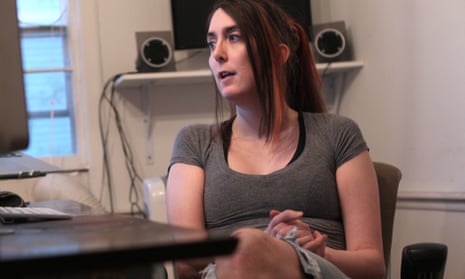Extra security guarded the door at the day-long online harassment summit on Saturday at Austin’s SXSW tech festival.
It’s for a good reason: threats of violence often accompany those who speak about the online hate mob Gamergate and its impact on women and minorities in the video game community. Those threats led the SXSW organizer Hugh Forrest, citing “threats of on-site violence”, to shut down the Gamergate discussion session. After public outcry, organizers relaunched it as a full-day program.
It’s a huge topic. Forty percent of internet users have experienced online harassment, according to Pew’s Maeve Duggan, and it’s most pronounced among young people with 65% of those 18-29 years old saying they have experienced harassment. Facebook is the number one place where it’s happening, according Andrea Weckerle, the founder of CiviliNation, which researches online harassment.
Weckerle added one statistic she found especially important: 12.9% of people say they’ve been physically threatened online. “Online is offline,” Weckerle said.
Joanne St Lewis, a law professor at the University of Ottawa, argued that American companies allow harassment that Canada would like to crack down on: “The conversation around online harassment is really a conversation about how you build your democracy.”
St Lewis said the only time she had felt similar levels of tension was when she was during work in South Africa under apartheid.
Trolls have become a larger public concern because they’ve become more aggressive over the years, said trolling expert and Northeastern assistant professor Joseph Reagle. They also have more access points now to reach victims through, as more of our lives play out online.
“I used to say don’t feed the trolls. That’s been out there for a long time,” Reagle said. “I would argue it’s no longer sufficient. The trolls in the 90s are not the same trolls we have today.”
He described the findings from a recent study on trolls: “Measures of sadism, psychopathy, and Machiavellianism positively correlate with trolling,” he said.
Even enjoying writing comments anywhere online means you’re more likely to be a troll. “Some people are very much taken with commenting online,” he said. “And there’s a strong relationship between online commenting frequency and trolling enjoyment.”
Susan Benesch, director of the Dangerous Speech Project, said much of this harassment comes down to a new sense of “disinhibition”. “Some people will say things online without really thinking about the consequences,” Benesch said. “When they are held to account, they come to their senses.”
Gamergate is a loose collection of people who believe that “social justice warriors” are trying to politicize video games by trying to make them more diverse. The movement grew into an amorphous and persistent mob with a coordinated campaign of harassment that targeted prominent women and minorities in the technology world.
While Gamergate may seem like a niche issue relevant only to those playing computer games, it has had enormous repercussions, especially today, as hate speech enters the mainstream alongside the rise of Donald Trump. It raises questions about how people stay safe online, who trolls are in the first place., and how social media companies crack down on online vitriol and threats while hewing to values of free speech.
The harassment summit’s lineup mixed well-known members of the gaming community with mainstream women’s rights advocates and large tech companies whose platforms are often used for harassment. Former Texas state senator Wendy Davis will speak, as will Massachusetts congresswoman Katherine Clark. Large tech companies are throwing their weight in: Facebook’s head of global product policy, Monika Bicker, and Juniper Downs, senior counsel at Google, are both heading panels. Longtime Gamergate targets Brianna Wu and Randi Harper will speak about their experiences.
Even the creation of the summit was mired in controversy and trolling.
Originally there were going to only be two panels – SavePoint: a Discussion in the Gaming Community and Level Up: Overcoming Harassment in Games. These were organized by two very different groups: one sympathetic to Gamergate and whose premise is “ethics in gaming journalism”, the canard behind the Gamergate movement; the second aiming to address online harassment.
Citing threats of violence against Level Up, SXSW shut down both before announcing this summit. The Gamergate-affiliated panel has also been rebooted and set for Tuesday.
